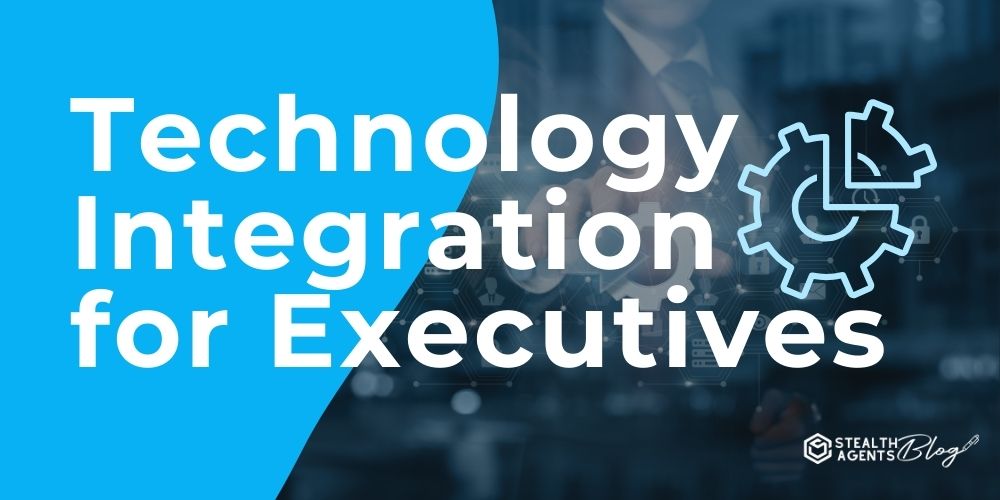Technology Integration Executives need reliable support to efficiently manage complex systems and drive seamless business alignment. Stealth Agents provides expert virtual assistants who help streamline technology projects and optimize integration efforts, allowing executives to focus on strategic goals and deliver impactful results.
Technology integration executives are key to aligning technology with business goals.
Did you know that while 87% of companies see digital integration as critical to success, only 40% feel ready for it?
These executives help close that gap, making operations smoother and more efficient.
As businesses grow, hiring a virtual assistant becomes a smart option for extra support and flexibility.
Virtual assistants can take on many tasks, so understanding virtual assistant pricing is essential for planning your budget.
With the right team in place, companies can easily manage the challenges of technology integration.
Stealth Agents can help you find or hire a virtual assistant. You can book a free consultation to customize services and explore virtual assistant pricing options.
Why are Technology Integration Executives Important?
Technology integration executives are crucial in today’s digital landscape as they bridge the gap between technical systems and business objectives.
These professionals ensure that technology aligns with an organization’s goals, facilitating smooth operations and improved productivity.
Companies rely on technology integration executives to implement complex systems that enhance data flow and improve decision-making processes.
With their expertise, businesses can avoid costly disruptions and maintain a competitive edge.
The presence of technology integration executives also helps in managing change effectively, as they coordinate between departments and ensure that new technologies are adopted seamlessly.
Their role in evaluating and integrating new technologies can lead to better resource management and increased efficiency.
As businesses grow and technology becomes increasingly complex, having skilled technology integration executives is more important than ever for long-term success.
How Does Technology Integration Help Executives Improve Efficiency?
Technology integration executives play a vital role in improving efficiency within organizations by aligning technological capabilities with business processes.
They ensure that systems operate cohesively, reducing redundancies and eliminating bottlenecks that can slow down operations.
By evaluating existing technologies and integrating new ones, these executives help streamline workflows and enhance productivity.
Technology integration executives also focus on refining data management, ensuring that information is readily accessible and accurately processed for informed decision-making.
Their efforts in coordinating between departments ensure that technology is used effectively, leading to smoother operations and quicker response times.
Furthermore, they are instrumental in training staff on new technologies, which minimizes downtime and maximizes resource utilization.
Overall, the expertise of technology integration executives is crucial for maintaining operational efficiency and supporting business growth.
What Services Does a Technology Integration Executive Offer?
1. System Coordination and Management
Technology integration executives excel in coordinating and managing various systems within an organization.
They focus on ensuring that different technologies work harmoniously, reducing operational hiccups.
This service is crucial for companies dealing with multiple platforms or software that need to communicate effectively.
By managing these systems, technology integration executives help prevent data silos and ensure a seamless flow of information.
Their expertise allows for smoother transitions and upgrades, minimizing disruptions.
They also handle troubleshooting and maintenance, ensuring systems remain functional and efficient.
Overall, their coordination efforts significantly enhance operational stability.
2. Process Improvement and Workflow Design
Technology integration executives offer services in refining and designing workflows to improve business processes.
They assess existing procedures and identify areas where technology can simplify tasks, making operations more efficient.
This involves rethinking tasks and finding ways to integrate technology to save time and resources.
By doing so, they help organizations eliminate unnecessary steps and reduce errors.
They also provide solutions that make processes more adaptable to change.
Their work in process improvement ensures that businesses can operate more smoothly and respond quickly to new challenges.
This service is vital for maintaining competitiveness in a rapidly changing environment.
3. Data Integration and Management
Managing data effectively is another crucial service provided by technology integration executives.
They focus on integrating data from various sources, ensuring it is accurate and accessible for decision-making.
This involves setting up systems that collect and organize data efficiently, reducing the time spent searching for information.
Their work ensures that data is stored securely and used effectively to support business objectives.
By managing data integration, they help improve the quality of insights and analytics.
This service is essential for companies making informed decisions based on reliable data.
It also supports long-term strategic planning by providing a solid foundation of information.
4. Change Management and Training
Technology integration executives are crucial in change management and training within organizations.
They guide companies through the adoption of new technologies, ensuring that transitions are smooth and well-received by employees.
This involves developing training programs that equip staff with the skills to use new systems effectively.
Their approach helps reduce resistance to change by highlighting the benefits and providing ongoing support.
They also monitor the implementation process, making necessary adjustments to ensure success.
Managing change helps organizations adapt to new technologies without disrupting day-to-day operations.
This service is essential for maintaining morale and productivity during periods of transition.
5. Security and Compliance Solutions
Ensuring the security and compliance of technology systems is a critical service that technology integration executives offer.
They assess risks and implement measures to protect sensitive information from unauthorized access and breaches.
This involves setting up security protocols and monitoring systems for potential vulnerabilities.
They also ensure that technology solutions comply with industry standards and regulations, reducing the risk of legal issues.
Their expertise in security helps safeguard company data and maintain customer trust.
They protect against cyber threats and data loss by providing comprehensive security solutions.
This service is indispensable for companies to secure digital assets and maintain compliance.
6. Vendor and Technology Assessment
Technology integration executives assist organizations in evaluating and selecting the right vendors and technologies.
They conduct thorough assessments to determine which solutions best fit the company’s needs and budget.
This involves analyzing the capabilities of different technology options and their compatibility with existing systems.
Their objective advice helps organizations make informed decisions that align with their strategic goals.
They also manage vendor relationships to ensure that services are delivered as promised.
Overseeing technology assessments helps avoid costly mistakes and ensure successful implementations.
This service is crucial for companies seeking to invest wisely in technology.
7. Project Management and Implementation
Managing technology projects from inception to completion is a crucial service that technology integration executives offer.
They oversee the planning, execution, and monitoring of projects to ensure they meet deadlines and budgets.
This involves coordinating teams, resources, and timelines to achieve project objectives.
Their comprehensive approach helps mitigate risks and address challenges promptly.
They also ensure that projects align with business goals and deliver measurable benefits.
By managing implementations effectively, they facilitate the successful adoption of new technologies.
This service is vital for organizations looking to execute technology projects smoothly and achieve desired outcomes.
What Skills Do Technology Integration Executives Need to Have?
-
Technical Proficiency
Technology integration executives need strong technical proficiency to manage and oversee the integration of sophisticated systems.
They should have a robust understanding of various software, hardware, and network technologies.
This knowledge allows them to address compatibility issues and ensure seamless system operations, a skill often exemplified by professionals in the Philippines’ Technical Support industry.
Being technically proficient helps them troubleshoot problems efficiently and implement reliable solutions.
They often work closely with IT teams to fine-tune systems and maximize performance.
Their ability to quickly grasp and adapt to new technologies is crucial in a rapidly changing tech landscape.
Technical skills are foundational for aligning technology with business strategy, making it essential to hire Technical Support Specialists to bolster these integration efforts.
-
Project Management Skills
Practical project management skills are essential for technology integration executives to lead projects from start to finish.
They must coordinate resources, timelines, and budgets to meet project goals, often utilizing the best project management software to streamline these processes.
Their role involves setting clear objectives and ensuring all team members meet these goals.
Good project management helps prevent delays and cost overruns by keeping the project on track.
They must also be adept at risk management, identifying potential issues before they become problems.
Their ability to communicate effectively with stakeholders ensures that everyone is informed and engaged.
This skill set is vital for delivering successful technology projects that meet business needs.
-
Communication and Interpersonal Skills
Technology integration executives must possess excellent communication and interpersonal skills to interact effectively with different teams.
Much like a Filipino communication specialist, they need to articulate complex technical concepts in a way that non-technical stakeholders can understand.
This skill is vital when presenting ideas, negotiating with vendors, or explaining project needs to executives.
Good communication fosters collaboration, ensuring all parties involved work towards common goals.
To achieve this, organizations may hire communication specialist professionals who can listen actively and understand others’ needs and concerns.
Building strong relationships within the organization helps them gather support for initiatives and navigate challenges.
Effective communication is critical to successful technology integration.
-
Problem-Solving Abilities
Problem-solving and solid abilities are crucial for technology integration executives as they encounter various challenges in their roles.
They must be able to analyze situations, identify root causes, and develop practical solutions quickly.
This skill is necessary for addressing unexpected issues during system integration or implementation.
Their ability to think critically and creatively helps them devise innovative approaches to overcome obstacles.
Problem-solving also involves evaluating the effectiveness of solutions and making adjustments as needed.
Being proactive in identifying potential issues helps prevent disruptions in business operations.
Overall, their problem-solving skills are essential for ensuring technology initiatives run smoothly.
-
Change Management Expertise
Technology integration executives need expertise in change management to guide organizations through technology transitions.
They must develop strategies to help employees adapt to new systems and processes.
This involves preparing comprehensive training programs and offering ongoing support.
Change management expertise helps minimize resistance and ensure a smoother adoption of new technologies.
It also monitors progress and gathers feedback to make necessary adjustments.
By managing change effectively, they help maintain productivity and morale during transitions.
This skill ensures that technological changes align with organizational goals and are embraced by all stakeholders.
Takeaways
Technology integration executives are pivotal in aligning technology with business goals, ensuring systems work harmoniously and efficiently.
Their expertise in managing complex integrations and fostering communication across departments is indispensable in today’s tech-driven world.
As organizations strive to maintain a competitive edge, the role of technology integration executives becomes increasingly essential.
Incorporating a virtual assistant can provide additional support and streamline tasks for businesses looking to enhance their operations.
Stealth Agents offers a resourceful solution where companies can call and book a free discussion to explore preferences and pricing options.
Whether you want to improve system coordination or need guidance on the latest technology trends, Stealth Agents is ready to assist with your integration needs.










